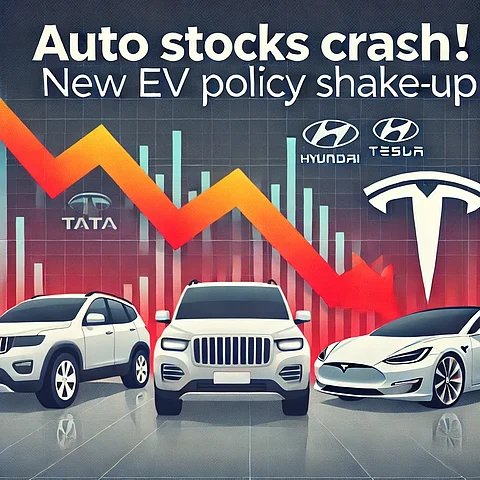
- Home
- Career Counseling
- Bharat
- Editorials
- Research
- Religion and Culture
- Corporate (Business News )
- State News Update
- Crimes News
- Education News
- Property News
- mocktest
- Life Style

On February 21, 2025, shares of prominent Indian automakers—Tata Motors, Mahindra & Mahindra (M&M), and Hyundai Motor India—experienced notable declines, with M&M shares seeing their most significant single-day drop in nearly seven months. This downturn is attributed to reports suggesting that the Indian government may ease electric vehicle (EV) import regulations, potentially reducing import duties to facilitate the entry of foreign players like Tesla into the Indian market. Such policy changes are anticipated to intensify competition for domestic automakers.
The proposed adjustments include a reduction in the Basic Customs Duty (BCD) on fully built EVs priced above $40,000 to 70%, accompanied by a 40% Agriculture Infrastructure and Development Cess (AIDC). While the 10% Social Welfare Surcharge (SWS) has been removed, the effective import duty for these EVs remains at 110%. For EVs priced below $40,000, the import duty continues to be 70%.
By 10:53 a.m. IST, the Nifty 50 index had declined by 0.67%, and the BSE Sensex dropped by 0.66%. The Nifty Auto index was down 2.5%, with Tata Motors, M&M, Hyundai Motor India, Maruti Suzuki, and Bajaj Auto among the top decliners. This week, the benchmark indexes have fallen by 0.7% and 0.9%, respectively.
The potential policy shift is significant, especially as Tesla has accelerated efforts to enter the Indian market, likely through direct imports rather than immediate local manufacturing. This development could reshape the competitive landscape, posing challenges for domestic manufacturers.
In response to the anticipated increase in competition, Tata Motors has announced plans to more than double its EV charging infrastructure to 400,000 points by 2027. This initiative aims to address range anxiety and bolster the adoption of EVs in India.
The Indian government's consideration of easing EV import norms aligns with its broader objective to increase EV adoption to 30% of total vehicle sales by 2030, up from the current 2.5%. While such measures could attract global players and enhance consumer choices, they also present challenges for domestic automakers to maintain their market positions amidst heightened competition.
The mainstream media establishment doesn’t want us to survive, but you can help us continue running the show by making a voluntary contribution. Please pay an amount you are comfortable with; an amount you believe is the fair price for the content you have consumed to date.
happy to Help 9920654232@upi
